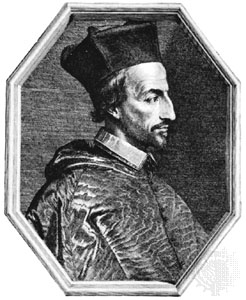Cornelius Jansen
Cornelius Jansen, often known as Jansenius (October 28, 1585–May 6, 1638) was Catholic bishop of Ypres and the father of the religious movement known as Jansenism.
Biography
He was born of humble Catholic parentage at Acquoy in the province of Utrecht in the Netherlands. In 1602 he entered the Pontifical University of Leuven, then in the throes of a violent conflict between the Jesuit, or scholastic, party and the followers of Michael Baius, who swore by St. Augustine. Jansen ended by attaching himself strongly to the latter "Augustinian" party, and presently made a momentous friendship with a like-minded fellow-student, Jean du Vergier de Hauranne, afterwards abbot of Saint Cyran.
After taking his degree he went to Paris, partly to improve his health by a change of scene, partly to study Greek. Eventually he joined Du Vergier at his country home near Bayonne, and spent some years teaching at the bishop's college. All his spare time was spent in studying the early Fathers with Du Vergier, and laying plans for a reformation of the Church.
In 1616 he returned to Leuven, to take charge of the college of St Pulcheria, a hostel for Dutch students of theology. Pupils found him a somewhat choleric and exacting master and a great recluse from academic society. However, he took an active part in the university's resistance to the Jesuits, for they had established a theological school of their own in Leuven, which was proving itself a formidable rival to the official university faculty of divinity. In the hope of suppressing their encroachments, Jansen was sent twice to Madrid, in 1624 and 1626; the second time he narrowly escaped the Inquisition. He warmly supported the Catholic missionary archbishop (apostolic vicar) of the (Northern) Netherlands, Rovenius, in his contests with the Jesuits, who were trying to evangelize that country without regard to the archbishop's wishes. He also crossed more than once the Dutch Calvinist-Presbyterian champion, Gisbertus Voetius, still remembered for his attacks on René Descartes.
Antipathy to the papally supported Jesuits brought Jansen no nearer Protestantism; on the contrary, he yearned to beat them with their own weapons, chiefly by showing them that Roman Catholics could interpret the Bible in just as mystical and pietistic a manner. This became the great object of his lectures, when he was appointed regius professor of scriptural interpretation at Leuven in 1630. Still more was it the object of his Augustinus, a bulky treatise on the theology of St. Augustine, barely finished at the time of his death. Its preparation was his chief occupation since his return to Leuven.
But Jansen, as he said, did not mean to be a school-pedant all his life; and there were moments when he entertained political ambitions. He looked forward to a time when Belgium would throw off the Spanish yoke and become an independent Catholic republic, possibly even Flemish-ruled, according to the model of the Protestant United Provinces. These ideas became known to his Spanish rulers, and to assuage them he wrote a philippic called the Mars gallicus (1635), a violent attack on French ambitions generally, and on Cardinal Richelieu's indifference to international Catholic interests in particular. The Mars gallicus did little to help Jansen's rather persecuted theological friends in France, but it reversed Madrid's wrath with Jansen; in 1636 he was appointed bishop of Ypres (Ieper) in West Flanders by the Pope and the Spanish Court. Within two years he was however cut down by a sudden illness; the Augustinus, the book of his life, was published posthumously in 1640. His theses were later on condemned by the Holy Office in 1643 and 1653.
See also
- Ultrajectine
- Jansenism
- Gallicanism
- Old Catholic Church of the Netherlands
External links
- JANSENISM RESOURCES: features various primary texts and discussions relating to the theology and history of Jansenism
- Cornelius Jansen on Find-A-Grave
ReferencesISBN links support NWE through referral fees
- This article incorporates text from the Encyclopædia Britannica Eleventh Edition, a publication now in the public domain.
| Persondata | |
|---|---|
| NAME | Jansen, Cornelius |
| ALTERNATIVE NAMES | Jansenius, Cornelius (Latin); Jansenius, Cornelius, Bp. (Latin); Jansenius, Corneille (French); Jansen, Corneille (French); Armacanus, Alexander Patricus (pseudonym) |
| SHORT DESCRIPTION | Bishop and theologian |
| DATE OF BIRTH | October 28, 1585 |
| PLACE OF BIRTH | Accoy, Utrecht, Netherlands |
| DATE OF DEATH | May 6, 1638 |
| PLACE OF DEATH | Ypres |
de:Cornelius Jansen es:Cornelio Jansen fr:Cornelius Jansen it:Giansenio nl:Cornelius Jansenius ja:コルネリウス・ヤンセン pl:Cornelius Jansen pt:Cornelius Otto Jansenius ro:Cornelius Jansen ru:Янсений sk:Cornelius Jansen sv:Cornelius Jansen
Credits
New World Encyclopedia writers and editors rewrote and completed the Wikipedia article in accordance with New World Encyclopedia standards. This article abides by terms of the Creative Commons CC-by-sa 3.0 License (CC-by-sa), which may be used and disseminated with proper attribution. Credit is due under the terms of this license that can reference both the New World Encyclopedia contributors and the selfless volunteer contributors of the Wikimedia Foundation. To cite this article click here for a list of acceptable citing formats.The history of earlier contributions by wikipedians is accessible to researchers here:
The history of this article since it was imported to New World Encyclopedia:
Note: Some restrictions may apply to use of individual images which are separately licensed.
